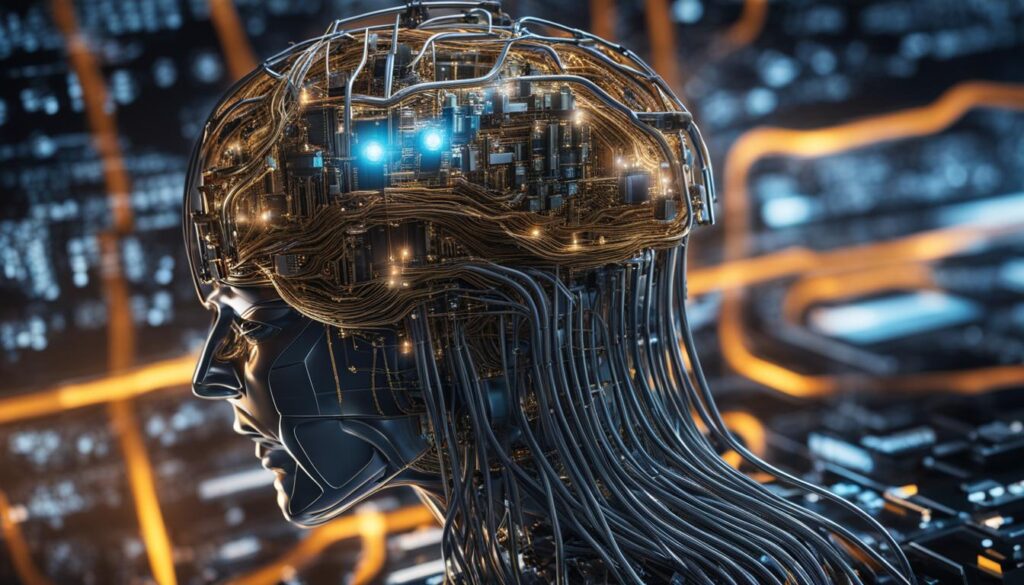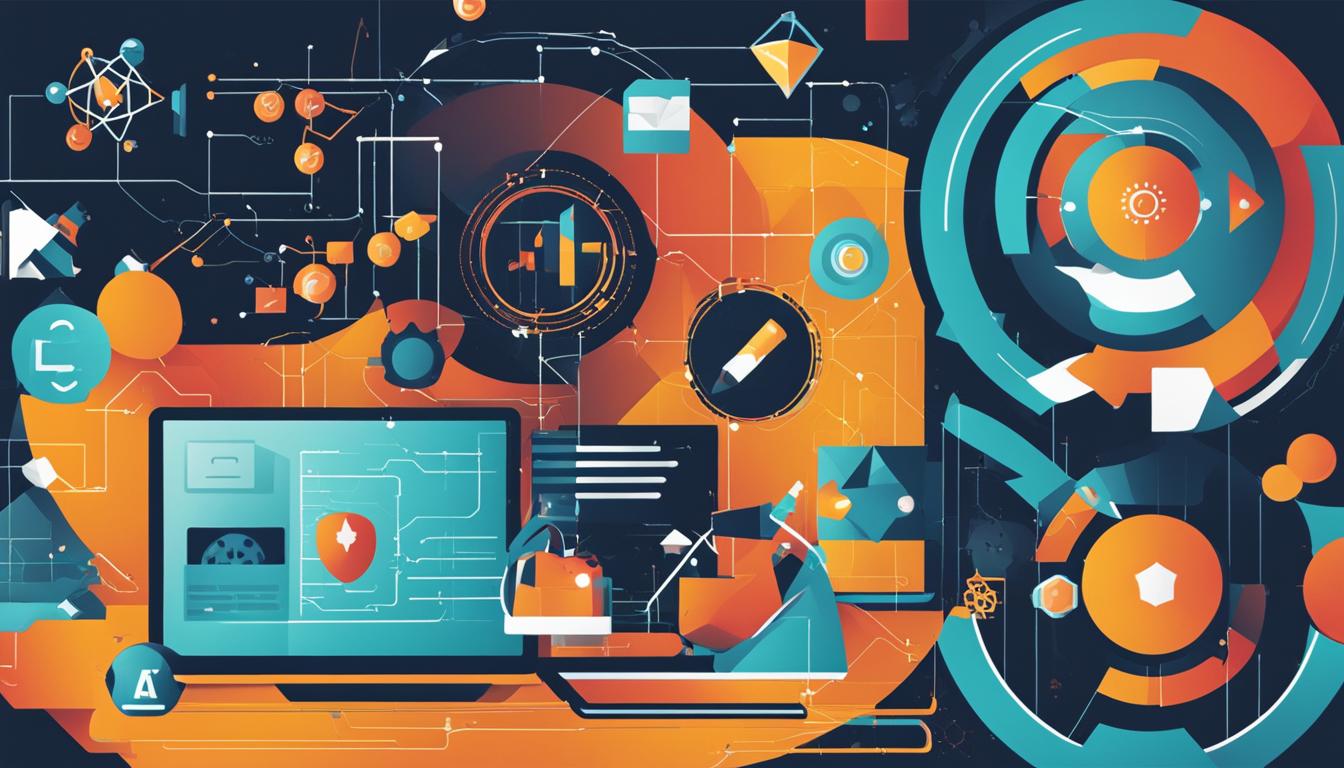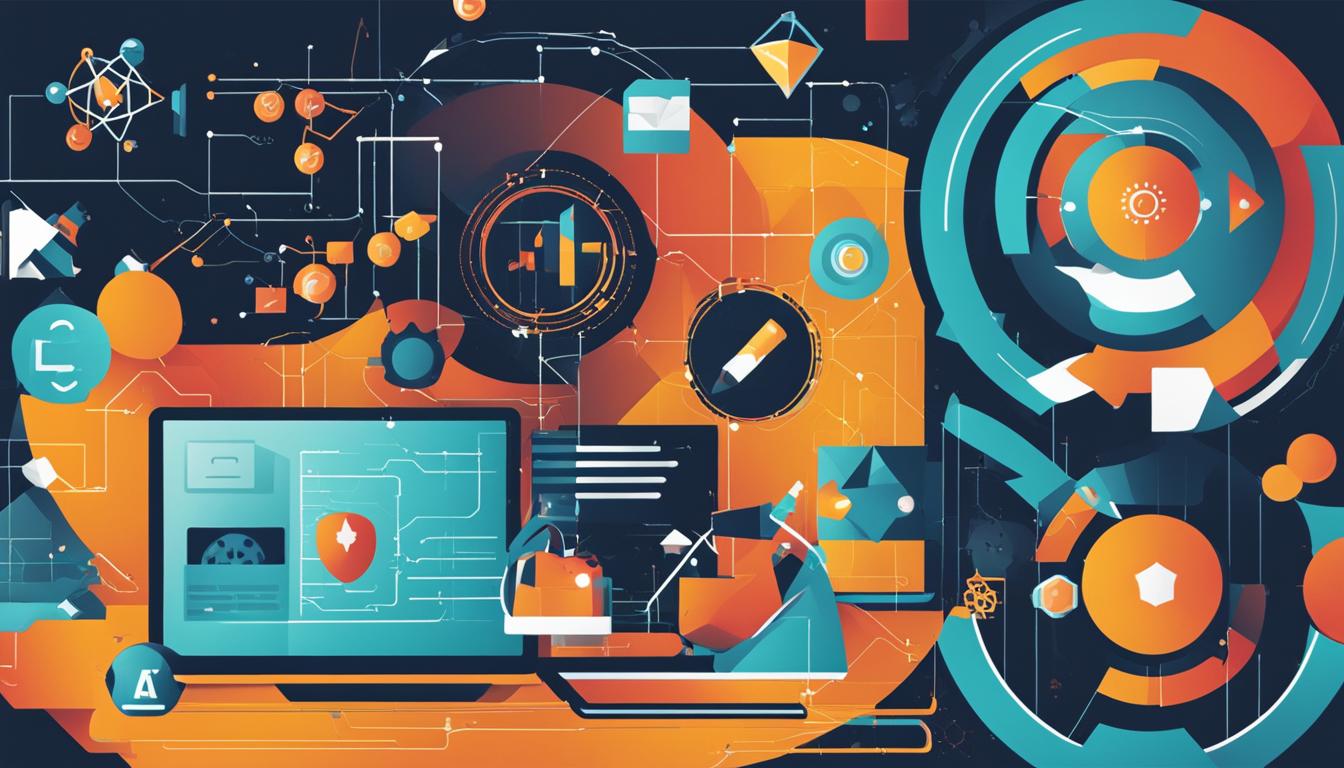Artificial intelligence (AI) and cognitive computing are often used interchangeably, but they have distinct differences in their approaches and applications. AI encompasses technologies like machine learning, deep learning, and natural language processing, while cognitive computing focuses on simulating human thought processes and providing decision support. In AI, the algorithms generate results independently, while in cognitive computing, human input is utilized for thinking, reasoning, and decision-making. Understanding these differences is crucial in various industries, such as healthcare, finance, retail, and manufacturing.
Key Takeaways:
- AI and cognitive computing have distinct differences in their approaches and applications
- AI encompasses technologies like machine learning, deep learning, and natural language processing
- Cognitive computing focuses on simulating human thought processes and providing decision support
- In AI, the algorithms generate results independently, while in cognitive computing, human input is utilized for thinking, reasoning, and decision-making
- Understanding the differences is crucial in industries such as healthcare, finance, retail, and manufacturing
What Is AI?
Artificial intelligence (AI) is a broad category of technologies that enable machines to think and act like humans. It encompasses various algorithms and techniques such as machine learning, deep learning, and natural language processing. AI systems are designed to process large amounts of data and identify patterns or make decisions based on environmental inputs.
AI finds applications in a wide range of industries and sectors. For example, in healthcare, AI is used for diagnosing diseases, analyzing medical images, and predicting patient outcomes. In finance, AI is utilized for fraud detection, portfolio management, and algorithmic trading. Other applications of AI include autonomous vehicles, virtual assistants, and video game opponents.
The potential of AI is immense, as it can perform tasks that typically require human intelligence. However, it is important to note that AI is still a rapidly evolving field, and there are ongoing discussions and debates about its ethical implications and potential risks.

AI Technologies
There are several key technologies that enable AI systems to function effectively:
- Machine Learning: Algorithms that allow AI systems to learn from data and improve their performance over time.
- Deep Learning: Neural networks with multiple layers that can process complex data and extract meaningful insights.
- Natural Language Processing (NLP): Techniques that enable AI systems to understand and generate human language.
- Computer Vision: Algorithms that enable machines to interpret and analyze visual information, such as images or videos.
AI Applications
AI has a wide range of applications across various industries:
- Healthcare: AI is used for medical imaging analysis, drug discovery, and personalized medicine.
- Finance: AI powers fraud detection systems, algorithmic trading, and customer service chatbots.
- Retail: AI is utilized for demand forecasting, inventory management, and personalized marketing.
- Manufacturing: AI helps optimize production processes, detect defects, and improve quality control.
- Transportation: AI is used in self-driving cars, traffic management systems, and logistics optimization.
These are just a few examples of how AI is transforming industries and impacting our daily lives. As technology continues to advance, the potential for AI applications will only continue to grow.
What Is Cognitive Computing?
Cognitive computing is a subset of AI that focuses on simulating human thought processes and providing decision support. It employs advanced self-learning algorithms and AI technologies like data mining, visual recognition, speech recognition, and NLP to analyze complex problems and find answers. Unlike traditional AI systems that operate independently, cognitive computing systems work collaboratively with humans, utilizing their input for thinking, reasoning, and decision-making.
Cognitive computing is capable of working with symbols and concepts, handling large amounts of data, and adaptively evolving its conclusions as new information enters the system. This technology finds various applications in industries such as healthcare, finance, retail, and manufacturing. In healthcare, cognitive computing helps doctors make more accurate diagnoses by analyzing patient data and providing relevant insights. In finance, it assists companies in offering personalized services to their clients. In retail, cognitive computing improves customer experience by understanding their preferences and providing tailored recommendations.
Applications of Cognitive Computing
Cognitive computing has a wide range of applications across multiple industries. Here are some notable examples:
- Healthcare: Cognitive computing systems can assist doctors in diagnosing diseases, analyzing medical images, and recommending treatment plans based on patient data.
- Finance: Cognitive computing can be utilized for fraud detection, risk assessment, investment analysis, and personalized financial services.
- Retail: By analyzing customer data and preferences, cognitive computing can enhance personalized marketing, optimize inventory management, and improve customer satisfaction.
- Manufacturing: Cognitive computing enables predictive maintenance, quality control, product optimization, and supply chain management.
- Customer Service: Cognitive computing systems can provide intelligent virtual assistants, chatbots, and voice recognition systems that enhance customer support and engagement.
Overall, cognitive computing complements AI by focusing on human collaboration and decision support. Its ability to analyze complex problems and provide valuable insights makes it an essential technology in various industries, transforming the way humans and machines work together to achieve better outcomes.
Table: Differences Between Cognitive Computing and AI
| Aspect | Cognitive Computing | AI |
|---|---|---|
| Interaction with Humans | Collaborative; involves human input for decision-making | Autonomous; operates independently without human input |
| Solution Context | Considers context and changing information to provide personalized solutions | Finds the best algorithm for accurate results |
| Use Cases | Healthcare, finance, retail, manufacturing, customer service | Automation, chatbots, virtual assistants, self-driving cars |
Key Differences Between Cognitive Computing and AI
When it comes to cognitive computing and AI, there are several key differences that set them apart. These distinctions lie in their interaction with humans, contextual solutions, and use cases. Understanding these differences is vital for organizations looking to harness the potential of these technologies effectively.
Interaction with Humans
In cognitive computing, human input is crucial for decision-making and problem-solving. The system works in collaboration with humans, providing advice and insights to support their decision-making processes. On the other hand, AI systems operate autonomously, generating results independently without direct human input. This distinction makes cognitive computing an ideal choice for industries where human intuition and expertise are essential, such as healthcare, finance, and manufacturing.
Contextual Solutions
Cognitive computing systems excel at incorporating context and changing information to provide personalized solutions. They are designed to analyze complex data and adapt their conclusions as new information is introduced. In contrast, AI focuses on finding the best algorithms to achieve accurate results based on the available data. This difference allows cognitive computing to offer tailored recommendations and insights, making it valuable in industries that require analysis-intensive decision-making processes.
Use Cases
Cognitive computing finds widespread use in industries where in-depth analysis and decision support are crucial. Healthcare professionals rely on cognitive computing systems to improve diagnoses and treatment plans, while finance companies utilize them to provide personalized services and make informed investment decisions. AI, on the other hand, is commonly used for automation and tasks like chatbots, virtual assistants, and self-driving cars. Both technologies have their unique applications, and understanding their distinctions is key to leveraging their full potential.
Table: Key Differences Between Cognitive Computing and AI
| Aspect | Cognitive Computing | AI |
|---|---|---|
| Interaction with Humans | Collaborates with humans to provide decision support | Operates autonomously without direct human input |
| Contextual Solutions | Considers context and changing information for personalized solutions | Focuses on finding the best algorithms for accurate results |
| Use Cases | Analysis-intensive industries like healthcare, finance, and manufacturing | Automation and tasks like chatbots, virtual assistants, and self-driving cars |
Potential for ROI in AI
Artificial Intelligence (AI) offers immense potential for return on investment (ROI) across various industries. By leveraging AI technologies, businesses can achieve financial gains, cost savings, increased productivity, and improved customer experiences. However, it is important to recognize and address the challenges that come with implementing AI systems.
One of the key benefits of AI is its ability to make work easier and more efficient. AI-powered automation can streamline repetitive tasks, freeing up valuable time for employees to focus on more strategic initiatives. Additionally, AI can analyze large volumes of data at a faster pace than humans, leading to faster decision-making and improved overall efficiency.
Furthermore, AI has the potential to enhance customer service. Chatbots and virtual assistants powered by AI can handle customer inquiries and provide personalized recommendations, improving the overall customer experience. AI systems can also analyze customer data to gain insights into purchasing patterns and preferences, allowing businesses to deliver more targeted and effective marketing campaigns.
Beyond financial gains and improved efficiency, AI also presents challenges that organizations need to address. One such challenge is the lack of control over decision-making. AI systems learn and make decisions based on data fed to them, which can sometimes result in unexpected outcomes. Organizations must ensure transparency and accountability in AI systems to mitigate any potential risks.
| AI Benefits | AI Challenges |
|---|---|
| Improved efficiency | Lack of control over decision-making |
| Enhanced customer service | Ensuring transparency and accountability |
| Streamlined decision-making | Continuous data analysis and improvement |
Overall, the potential for ROI in AI is significant, with the ability to drive financial gains, improve efficiency, and deliver enhanced customer experiences. However, organizations must carefully consider the challenges and take proactive measures to ensure the successful implementation and management of AI systems.

Similarity between Cognitive Computing and AI
In the world of technology, cognitive computing and AI share several similarities in terms of their underlying technologies, applications, and goals. While they have distinct differences, they both utilize cutting-edge technologies to streamline decision-making processes and learn from experience.
Shared Technologies
Both cognitive computing and AI make use of advanced technologies such as machine learning, neural networks, and deep learning. These technologies enable systems to analyze and process large amounts of data, identify patterns, and make intelligent predictions. By leveraging these technologies, both cognitive computing and AI aim to replicate certain aspects of human intelligence and behavior.
Common Applications
Cognitive computing and AI find applications in a wide range of industries and sectors. They are used in customer service to provide personalized assistance and recommendations, in healthcare to assist with diagnoses and treatment plans, and in finance to detect fraud and assess risk. Furthermore, both cognitive computing and AI are being employed in areas such as autonomous vehicles, robotics, and virtual assistants, revolutionizing the way we interact with technology.
Continuing Advancements
As technology continues to advance, the capabilities of cognitive computing and AI will expand. This will lead to more diverse and efficient solutions that can address complex problems and enhance human decision-making. The ongoing development of these technologies presents exciting opportunities for innovation and growth in various industries.
| Cognitive Computing | AI | |
|---|---|---|
| Definition | Focuses on simulating human thought processes and providing decision support. | Encompasses technologies that enable machines to think and act like humans. |
| Technologies | Utilizes machine learning, neural networks, and deep learning. | Includes machine learning, deep learning, and natural language processing. |
| Applications | Assists with diagnoses, personalized services, and improving customer experience. | Enables visual identification, speech recognition, and automation tasks. |
Conclusion
In conclusion, the distinction between AI and cognitive computing is essential to understanding their respective roles in the digital realm. While AI focuses on autonomous decision-making and automation, cognitive computing aims to mimic human thought processes and provide decision support. Their differences can be observed in their interaction with humans, contextual solutions, and use cases.
AI operates independently, while cognitive computing relies on human input. Cognitive computing offers personalized solutions based on context and changing information, whereas AI focuses on finding the most accurate algorithm. Cognitive computing finds applications in analysis-intensive industries such as healthcare, finance, and manufacturing, whereas AI is commonly used for automation processes like chatbots, virtual assistants, and self-driving cars.
Understanding the disparities between AI and cognitive computing is crucial for industries seeking to harness the potential of these technologies. As they continue to advance, their impact on sectors like healthcare, finance, retail, and manufacturing will undoubtedly expand. By comprehending the unique approaches and applications of AI and cognitive computing, organizations can leverage their capabilities to drive innovation and efficiency.
FAQ
What is the difference between AI and cognitive computing?
AI encompasses technologies like machine learning, deep learning, and natural language processing, while cognitive computing focuses on simulating human thought processes and providing decision support.
What is AI?
AI is a superset of technologies that enable machines to think and act like humans. It involves algorithms trained to find the best way to perform a function or make a decision based on environmental inputs.
What is cognitive computing?
Cognitive computing is a subset of AI that focuses on providing decision support to humans. It uses self-learning algorithms and AI technologies to find answers to complex problems by simulating human thought processes.
What are the key differences between cognitive computing and AI?
Cognitive computing systems work with humans to provide advice and insights for decision-making, while AI works autonomously without human input. Cognitive computing can consider context and changing information, whereas AI focuses on finding the best algorithm for accurate results.
What is the potential for ROI in AI?
The potential for ROI in AI varies among companies and can be measured in terms of financial gains, cost savings, productivity increases, customer experience, and future opportunities.
What are the similarities between cognitive computing and AI?
Both cognitive computing and AI utilize technologies like machine learning and deep learning to streamline the decision-making process and learn from experience. They have applications in various fields, ranging from customer service and healthcare to risk assessment and fraud detection.
What should industries understand about AI and cognitive computing?
Understanding the differences between AI and cognitive computing is important for industries looking to leverage their potential. As these technologies advance, their impact on various sectors will continue to grow.
 Skip to main content
Skip to main content


